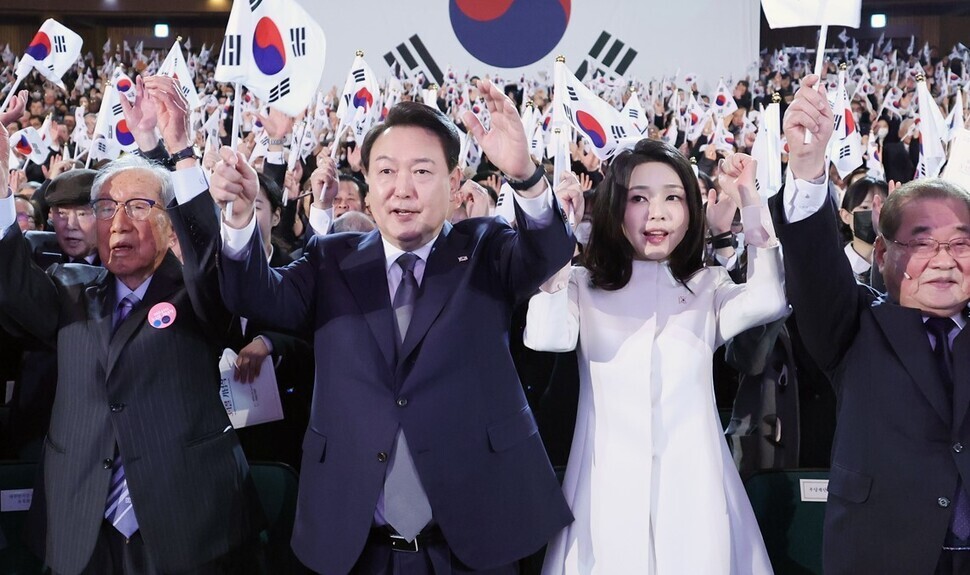hankyoreh
Links to other country sites 다른 나라 사이트 링크
[Editorial] Yoon is prioritizing partnership with Japan over resolving historical issues

In his first speech commemorating the March 1 Independence Movement since taking office, South Korean President Yoon Suk-yeol said Wednesday that “a century after the March First Independence Movement, Japan has transformed from a militaristic aggressor of the past into a partner that shares the same universal values with us.”
His speech included no mention at all of the historically contentious issues between South Korea and Japan, including Japan’s use of forced labor and military sexual slavery during its occupation of Korea. He also made no demands for reflection or an apology by Japan.
Instead, he merely stressed the crucial need for cooperation with Japan, stating that “trilateral cooperation among the Republic of Korea, the United States and Japan has become more important than ever to overcome the security crises including North Korea’s growing nuclear threats and global polycrisis.”
This cannot be seen as anything but the administration losing its sense of balance. Of all the occasions when it could have done so, it’s baffling that it chose a March 1 Independence Movement Day address to abruptly send a message hinting at unilateral capitulation on Seoul’s part, without any prior explanation to the South Korean public.
In the past, South Korean presidents — conservative and progressive alike — have always used March 1st Independence Movement Day addresses as a platform to emphasize the need for constructive, future-oriented relations between Seoul and Tokyo, while also demanding a change in attitude and sincere reflection from Japan.
The latest address was a major break from that practice. While it certainly is important to have neighborly, cooperative relations with Japan, this kind of excessively abrupt shift is not the right approach — and it’s unlikely to lead to relations being improved in a practical sense.
If the administration rushes too much to change course without establishing a popular consensus first, that approach is very likely to cause internal conflict at home. It may also send Japan the wrong message — that is, that South Korea intends to take the first step in capitulating itself.
Most worrying of all is the prospect that Wednesday’s message will translate into a subordinate stance in the Yoon administration’s diplomatic dealings with Japan.
Now the president has spoken along these lines, we’re likely to see the administration speeding up its efforts to usher trilateral cooperation with the US and Japan up to the level of a trilateral alliance. That raises the grave danger of South Korea winding up a minor partner in the US-Japan alliance.
In a more immediate sense, it also gives Japan more leverage when it comes to the current discussions between the two sides on compensation for forced labor during the occupation. Seoul has been pushing for a plan where compensation would be provided by means of a third-party — specifically, the Foundation for Victims of Forced Mobilization by Imperial Japan — while Japan has refused to allow its own businesses to take part in contributing funds.
The victims and their family members, for their part, have been up in arms and are demanding sincere measures from Japan, including an apology and financial participation in the compensation. This is not a matter where South Korea ought to simply capitulate.
When it comes to diplomacy with Japan, we need to balance practical benefits with moral imperatives. At a time when historically rooted rancor and territorial dispute issues remain between the two sides, we can only achieve practical progress with bilateral relations when it is backed up by a more progressive change in stance from Tokyo — and the consent of the people who were victimized.
Please direct questions or comments to [english@hani.co.kr]

Editorial・opinion
![[Editorial] Yoon must halt procurement of SM-3 interceptor missiles [Editorial] Yoon must halt procurement of SM-3 interceptor missiles](https://flexible.img.hani.co.kr/flexible/normal/500/300/imgdb/child/2024/0501/17145495551605_1717145495195344.jpg) [Editorial] Yoon must halt procurement of SM-3 interceptor missiles
[Editorial] Yoon must halt procurement of SM-3 interceptor missiles![[Guest essay] Maybe Korea’s rapid population decline is an opportunity, not a crisis [Guest essay] Maybe Korea’s rapid population decline is an opportunity, not a crisis](https://flexible.img.hani.co.kr/flexible/normal/500/300/imgdb/original/2024/0430/9417144634983596.jpg) [Guest essay] Maybe Korea’s rapid population decline is an opportunity, not a crisis
[Guest essay] Maybe Korea’s rapid population decline is an opportunity, not a crisis- [Column] Can Yoon steer diplomacy with Russia, China back on track?
- [Column] Season 2 of special prosecutor probe may be coming to Korea soon
- [Column] Park Geun-hye déjà vu in Yoon Suk-yeol
- [Editorial] New weight of N. Korea’s nuclear threats makes dialogue all the more urgent
- [Guest essay] The real reason Korea’s new right wants to dub Rhee a founding father
- [Column] ‘Choson’: Is it time we start referring to N. Korea in its own terms?
- [Editorial] Japan’s rewriting of history with Korea has gone too far
- [Column] The president’s questionable capacity for dialogue
Most viewed articles
- 1Months and months of overdue wages are pushing migrant workers in Korea into debt
- 2Trump asks why US would defend Korea, hints at hiking Seoul’s defense cost burden
- 3At heart of West’s handwringing over Chinese ‘overcapacity,’ a battle to lead key future industries
- 4[Editorial] Yoon must halt procurement of SM-3 interceptor missiles
- 5Fruitless Yoon-Lee summit inflames partisan tensions in Korea
- 6Dermatology, plastic surgery drove record medical tourism to Korea in 2023
- 71 in 3 S. Korean security experts support nuclear armament, CSIS finds
- 8AI is catching up with humans at a ‘shocking’ rate
- 9First meeting between Yoon, Lee in 2 years ends without compromise or agreement
- 10[Guest essay] Maybe Korea’s rapid population decline is an opportunity, not a crisis